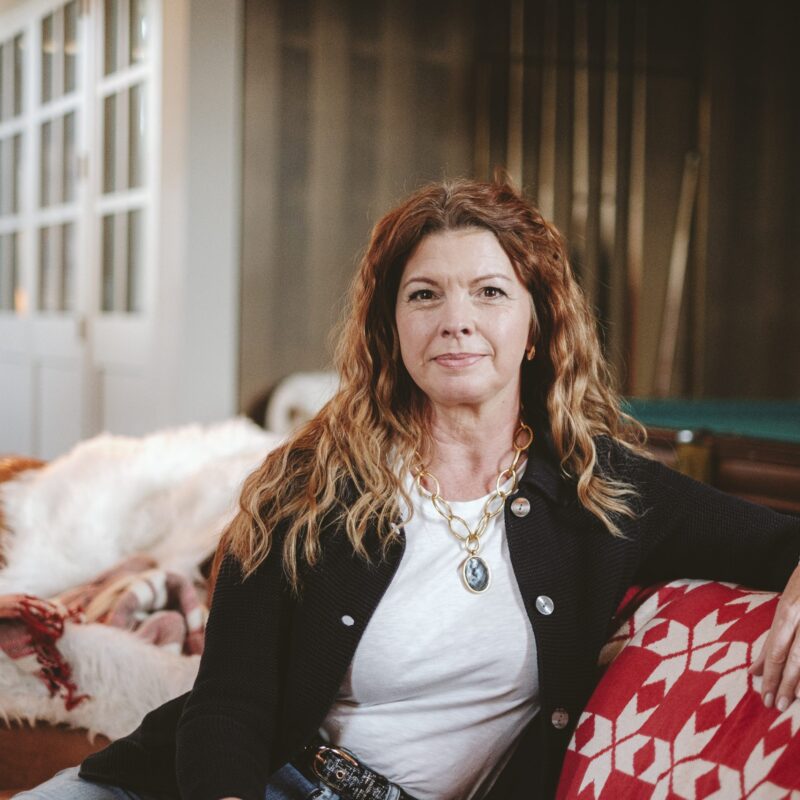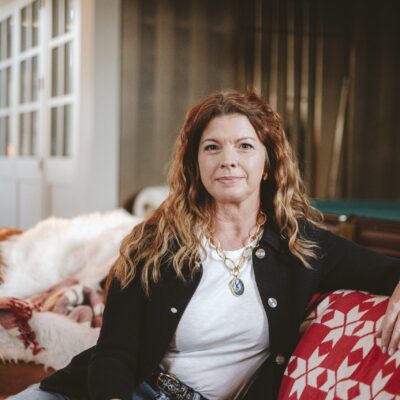The trouble with using local foodstuffs in the restaurant world is that availability is unpredictable and expensive. Oh sure, a chef can head down to the farmers’ market and pay a little extra for a few pounds of something that looks particularly tasty that week. We know a few who come up with weekly specials this way. Relying on local suppliers for regular menu items, however, can be difficult to impossible. Unless you’re Mark Cosgrove, that is. As chef and part owner of Fardowners restaurant in Crozet, Cosgrove figured out a way to keep himself flush with local food—he convinced Susan Vidal of Brightwood Vineyard and Farm in Madison to carve out a section of her vegetable garden just for him.
“We try to use as many local products as possible, and made that one of our mission statements,” says Cosgrove. To accomplish that mission, Cosgrove met with Vidal in January to plan out a special plot for Fardowners.
|
Local food yokels: Susan Vidal of Brightwood Vineyard and Farm in Madison reserves a section of her vegetable garden for Mark Cosgrove, owner of Fardowners restaurant in Crozet. |
Vidal says that she was nervous about the arrangement at first, worried that she wouldn’t be able to predict Cosgrove’s needs, but the farm-to-chef’s-table relationship has been a success.
“He estimated how much he would need, and I figured out how much I would need to plant. It’s worked out very well. It’s been nice to have that steady income,” says Vidal.
In Cosgrove’s little corner of Brightwood, Vidal has grown Swiss chard, okra, peppers and heirloom tomatoes. In addition to these items, Cosgrove also takes regular deliveries of eggs from Vidal’s heritage breed laying hens, and a variety of berries. Later in the season, Brightwood will provide Cosgrove with a steady stream of squash.
So far, Fardowners is Brightwood’s only restaurant customer, but based on the success with Cosgrove, Vidal says she’d like to add more chefs to the mix to maximize her deliveries down to the Charlottesville and Crozet area. A direct-to-restaurant business would add to the farm’s already busy operations, which began with one acre of pumpkins in 2001 and has grown to 35 acres of crops and grazing land on which Vidal and her husband, Dean (who still works a full-time job out of Dulles), tend to a variety of plants and animals. Out of the farm and at farmers’ markets, the Vidals sell vegetables, flowers, herbs and eggs as well as jams and jellies made from the berries and from native American and hybrid grapes that they’re experimenting with in the hopes of making wine in the future. Brightwood also sells meat from rare, heritage breed Spanish goats, mostly wholesale to a halal butcher in Warrenton.
“We want the enterprises to fit together both economically and ecologically,” says Vidal. “The barn straw from our goats is used to mulch the berries, for example. We’ve also moved farther and farther away from chemical agriculture. We’re certified organic in almost everything.”
The Vidals also run a bed and breakfast in a little cottage on the property, but they’re currently using just over a quarter of the farm’s 100 total acres. In other words, there’s still plenty of room for growth. If we were a chef, we’d be trying to carve out a piece of that pasture for ourselves.
Smooth moves
Fans of Tropical Smoothie Café will be happy to know that an outpost of the franchise is scheduled to open in the next week or so in the Rio Hill Shopping Center next to Lime Leaf Thai. This one comes from Chris Daschbach. We know what you’re thinking, and no, Daschbach wasn’t behind the Tropical Smoothie that closed on the Corner. And yes, he knows there was a Tropical Smoothie that closed on the Corner. From what he’s heard, lack of parking and seasonality is what led to that Smoothie’s demise. Daschbach doesn’t expect to have those problems at his location.






